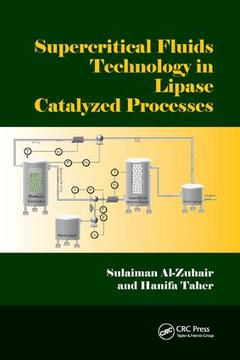Description
Supercritical Fluids Technology in Lipase Catalyzed Processes
Authors: Al-Zuhair Sulaiman, Taher Hanifa
Language: English
Subjects for Supercritical Fluids Technology in Lipase Catalyzed...:
Keywords
Nuclear Magnetic Resonance; catalysis; Glycerol Ester Hydrolases; industrial chemistry; Biodiesel Production Yields; green chemical engineering; Continuous Biodiesel Production; enzyme processes; Runge Kutta Integration Method; enzymatic reactions systems; Sol Gel Entrapment; catalyzed reactionssupercritical fluidslipase immobilizationbiochemical engineering; Enzymatic Biodiesel Production; Catalyst; Solvent Free Systems; Lipase; Moisture Content; Esterase; Lipase Immobilization; Phospholipases; Biodiesel Production; Interfacial Activation; Solid State Fermentation; Microalgae Lipids; Lipase Physiochemical Properties Improvement; Soluble Lipase; Immobilized Lipase Reactors; FBR System; Reaction Mechanisms; Water Immiscible ILs; Kinetic Models; Higher Activity Recovery; Lipase-Catalyzed Reactions in Nonaqueous Media; Immobilized Enzyme; Organic Solvents; Lipase Production; Supercritical Fluids; Broth Assay; Ionic Liquids; Thiele Modulus; IL–SC-CO2 Biphasic Systems; Microbial Lipases; Lipase-Catalyzed Production of Biodiesel Using Supercritical Technology; MRs; Biodiesel; ILs; Feedstocks; Rhizomucor Miehei Lipase; Lipase-Catalyzed Transesterification; Lipase-Catalyzed Reactions with Supercritical Fluids; Hanifa Taher
73.59 €
In Print (Delivery period: 14 days).
Add to cartPublication date: 07-2017
· 15.6x23.4 cm · Paperback
148.11 €
In Print (Delivery period: 15 days).
Add to cartPublication date: 12-2015
· 15.6x23.4 cm · Hardback
Description
/li>Contents
/li>Biography
/li>
Enzymes are currently used in various industries, most commonly in food, detergents, and pharmaceuticals production. Lipases are hydrolytic enzymes that demonstrate great potential as an alternative to conventional catalysts in a number of industrial applications. A complete understanding of enzymes, and their proteins structure and environmental behavior, can greatly aid in the further development of industrial applications. Supercritical Fluids Technology in Lipase Catalized Processes provides basic information about enzymes, their sources, reaction kinetics, and main industrial applications. The book focuses in lipases. their main sources, structure, and features, with an emphasis on their specificity and interfacial activity, and presents proven techniques for isolating, extracting, and purifying.
Comprised of six compact chapters, this comprehensive guide introduces:
- Immobilization techniques and immobilized lipases that allow repeated use (which is essential from an economic point of view)
- Different bioreactor configurations using immobilized lipases
- The latest information on the available technologies in lipolytic reactions
- The advantages of nonaqueous media in biochemical synthesis over aqueous and solvent-free systems
- Material on the use of lipases in nonaqueous media to overcome the drawbacks usually encountered with the use of conventional chemical catalysts
- The use of supercritical fluids (SCFs) as a green alternative reaction medium
- Factors affecting the physical properties of lipases in this medium and, hence, their activity and stability
- A case study using supercritical carbon dioxide (SC-CO2) for biodiesel production
- Novel, cutting-edge technology, using immobilized enzymes to reduce the overall production cost
Supercritical Fluids Technology in Lipase Catalized Processes
Enzyme Fundamentals. Lipases. Lipase Immobilization. Kinetics of Soluble and Immobilized Enzymes. Lipase-Catalyzed Reactions in Nonaqueous Media. Lipase-Catalyzed Production of Biodiesel Using Supercritical Technology. References.
Sulaiman Al-Zuhair is a professor of chemical engineering at UAE University. Prior to joining UAE University in 2006, Al-Zuhair worked as an assistant professor in the School of Chemical and Environmental Engineering at Nottingham University, Malaysia Campus. He obtained his PhD in biochemical engineering from the University of Malaya in 2003, his MSc degree in chemical and environmental engineering from University Putra Malaysia in 1998, and his BSc degree in chemical engineering from the Jordan University of Science and Technology in 1996. Al-Zuhair has published more than 50 peer-reviewed journal papers, two patents, and two book chapters.
Hanifa Taher is an assistant professor of chemical and environmental engineering at the Masdar Institute of Science and Technology. She earned her PhD in chemical engineering from the UAE University in June 2014. Taher’s research work is focused on the enzymatic production of biodiesel from lipids extracted from different feedstocks using supercritical carbon dioxide (SC-CO2). Taher developed a novel integrated continuous biodiesel production process in SC-CO2. Taher has reviewed a number of research articles submitted for publication to international journals.




